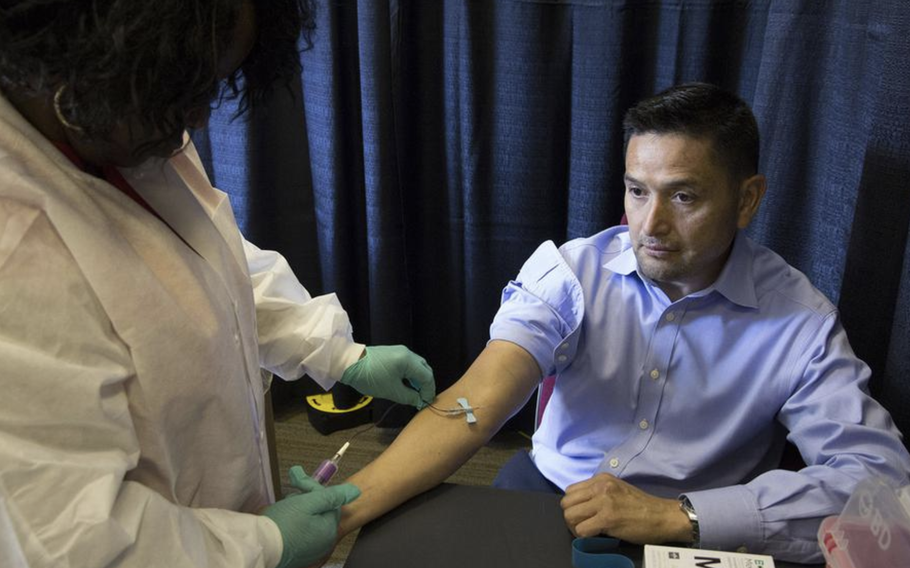
A blood sample is collected at the American Legion headquarters in Washington, D.C., in 2017 from a veteran participating in a long-term VA research program to develop a database of genetic information on veterans. (Stars and Stripes)
WASHINGTON — A research program launched more than 12 years ago by the Department of Veterans Affairs is close to reaching its goal of collecting genetic information from blood samples on 1 million veterans, a VA researcher told senators Wednesday.
Called the Million Veteran Program, the initiative is being conducted through the VA’s Office of Research and Development with a mission to better understand how genetics, lifestyle, military service and environmental exposure impacts veterans’ health, according to Sumitra Muralidhar, the program director.
“It is the world’s largest cohort right now. We have just under 8,000 [blood samples] to go to get to a million veterans. This is a partnership that we actually established with veterans right from the beginning,” Muralidhar told lawmakers at a Senate Veterans Affairs Committee hearing that focused on research underway at the VA.
Muralidhar said the program, which launched in 2011, involves the voluntary collection of individual blood samples during 20-minute visits by veterans at VA hospitals. Personal information on an individual’s background, including military history, also is collected through interviews and surveys.
Veterans are asked to provide their consent before blood samples are drawn for the collection and study of genetic and other molecular data.
Participants must agree to be contacted again and allow researchers access to their health records. Program officials will need access to health records “on an ongoing basis,” according to a VA website about the program.
Muralidhar said the data collected from biospecimens and electronic health records is curated and provided to VA researchers through secure methods to further studies on diseases.
The data is coded so confidential information is not shared, including names, birth dates and Social Security numbers.
“We have over 100 projects doing work with this data set,” Muralidhar said.
As example, she noted one research project for predicting the genetic risk of metastatic prostate cancer in African Americans.
“That polygenic risk score is now being tested in a clinical trial,” Muralidhar said.
She said the ethnic diversity represented in the genetic information collected is 18% is African American, 8% Hispanic, and about 1% Asian, Native American and Pacific Islander.
“Our goal is after we get to 1 million, we will start diversifying the cohort more. We will have focused campaigns to recruit more of the underrepresented populations in this program,” Muralidhar said.
Sen. Richard Blumenthal, D-Conn., said he has been a VA committee member for 12 years and has never heard of the genetic collection program. He said there needs to be greater awareness of the database and its potential applications for identifying people at risk of diseases.
“Researchers are looking at numerous health conditions such as PTSD, depression, diabetes and heart disease that also are associated with certain genetic factors. I think there’s a potential here that is very, very important,” he said.